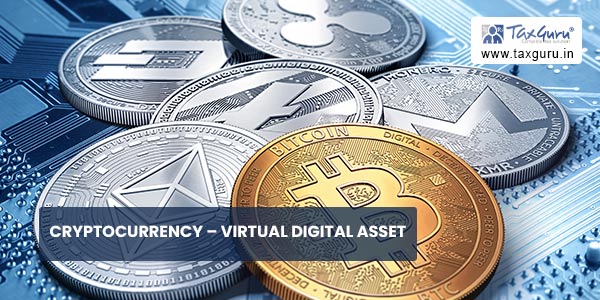Cryptocurrency is a form of virtual digital asset which is designed to work as a medium of exchange using cryptography to secure the transactions and to control the creation of assets. It has become one of the fastest upcoming modes of investment. Crypto refers to the various algorithms and techniques that safeguard these entries such as elliptical curve encryption, public private key pairs and hashing functions. It is a collection of binary data which is designed to be anonymous and secure wherein data is converted into codes. These are decentralized in nature, which means no single entity owns or controls them. It does not rely on central banks and is designed to work as a medium of exchange using its underlying block chain technology. In a block chain network, the ledger which is collection of transaction records is distributed. On initiation of transfer, a new block with transaction details is created and broadcast to all the network participants. It is a peer-to-peer system that allows anyone to make and receive payments from anywhere. Cryptocurrency payments exists solely as digital entries to an online database identifying specific transactions rather than as tangible money carried around exchanged in the real world. The transactions that you make with cryptocurrency funds are recorded in a public ledger. Digital wallets are used to store cryptocurrency. Cryptocurrencies can be mined or purchased from cryptocurrency exchanges.
By 2025, the global cryptocurrency market is expected to be worth $ 2.73 billion. As per reports published by financial institutions, there are currently over 8500 cryptocurrencies in the world and increasing with market capitalization of over $ 2 trillion. The reason for the explosion of cryptocurrency is because it has fairly low barrier to entry.
Page Contents
Advantages of Cryptocurrencies
Some of the advantages of Cryptocurrencies are:
- Cheaper and faster money transfers with decentralized systems which do not collapse at a single point of failure
- No involvement of third parties such as banks and monetary institutions
- Cryptocurrency investments can generate huge profits, the values have skyrocketed over the last decade
Disadvantages of Cryptocurrencies
Some of the disadvantages of Cryptocurrencies are:
- Cryptocurrencies include price volatility, high energy consumption for mining activities and use in criminal activities.
- Leaves a digital trail which can be deciphered allowing authorities to track financial transactions of individuals
- Given its digital nature, transactions are prone to be hacked

Types of Cryptocurrencies
There are two types of crypto assets – coins and tokens. Coins have their own blockchain network while tokens are part of projects built on top of existing blockchains.
Bitcoin is the most popular and valuable cryptocurrency. It was made available to public in 2009 and remains the most widely traded and covered cryptocurrency. As of Nov 2021, there were over 18.8 million bitcoins in circulation with total market capitalization of $1.2 trillion.
With the success of Bitcoin, many other cryptocurrencies have been launched known as Altcoins. Some of these are replica of Bitcoin while others have been built from scratch. They include Solana, Litecoin, Ethereum, Cardano and EOS.
Budget 2022-23: Tax on Digital Assets
Virtual Digital assets have gained tremendous popularity in recent times and the volumes have increased substantially. With a view to bring clarity on taxation of such assets, the Government of India announced taxation on digital assets. The key extract with regard to taxation on digital assets is as below:
- Introduced the provisions of Section 115BBH wherein the profits from transfer of digital assets would be taxed at flat rate of 30% (plus cess and surcharge in applicable cases)
- For computing the income arising from transfer of digital assets, no deduction for any expenditure or allowances or set off of any loss is allowed apart from the cost of acquisition of these virtual assets
- In case of losses on transfer of digital assets would be allowed as set off only in the year in which the loss was incurred against gains from transfer of the same type of assets
- Losses on transfer of digital assets will not be allowed to be carried forward to subsequent assessment years
- Introduced provisions of Section 194S to the Act wherein Buyer of Crypto has to withhold 1% of TDS before paying. TDS would be applicable whether the seller of the asset transfers by way of cash or through kind or partly in kind and in cash. No deduction will be required wherein the consideration paid during the FY does not exceed Rs 50,000 (in case of specified person) or Rs 10,00 (in any other case). Provisions of Section 203A (Tax Deduction and Collection number) and 206AB (higher TDS rates for non – filers of ITR) will not be applicable to payments made by specified persons.
- Exchanges may undertake TDS compliance
- Losses incurred under any business (speculative or non – speculative) would not be allowed to be set off against income from transfer of digital assets
- Assessee is not allowed any basic exemption limit in case the only income during the year is from the transfer of digital assets.
****
About the Author :  Author is Ruchika Bhagat, FCA helping foreign companies in setting up and closure of business in India and complying with various tax laws applicable to foreign companies while establishing a business in India. Neeraj Bhagat & Co. Chartered Accountants, is a well-established Chartered Accountancy firm founded in the year 1997 with its head office at New Delhi.
Author is Ruchika Bhagat, FCA helping foreign companies in setting up and closure of business in India and complying with various tax laws applicable to foreign companies while establishing a business in India. Neeraj Bhagat & Co. Chartered Accountants, is a well-established Chartered Accountancy firm founded in the year 1997 with its head office at New Delhi.





